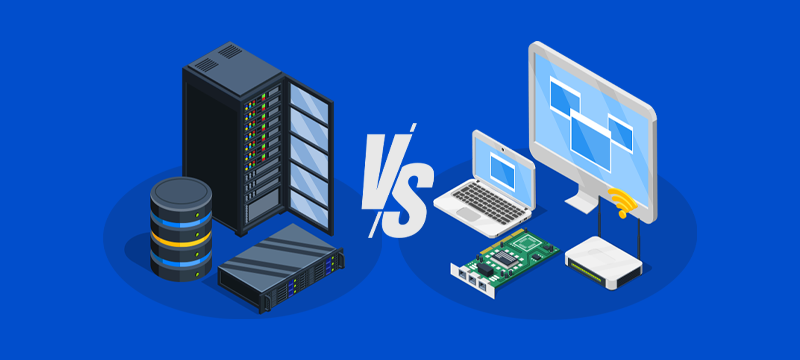These days, the internet has become an important aspect of our day-to-day life. Proper use of the internet helps us do tasks easily, quickly, and simply. The Internet helps with communication, business connections, and distribution of information. The foundation behind this massive online network of servers is a web of servers that host numerous websites and deliver proper information when requested. The best web hosting services prioritize customer satisfaction by offering reliable uptime, robust security features, and responsive technical support.
During the initial stages of web hosting, the setup mainly involved a basic web server operating on a standard computer unit. Initially, this form of web hosting lacked strong physical security measures and had limited data storage capabilities. Notably, the NeXT computer, utilized as a server by Berners-Lee, bore the advisory message “This machine is a server. DO NOT POWER DOWN!” as a piece of evidence of the primary nature of the early web hosting infrastructure. At first, it seemed to be a very feasible option, but it becomes necessary to understand the fundamental difference between a dedicated web server and your regular PC and why you need a server to host a website.
A web server and a personal computer contrast significantly in their capabilities and purposes, particularly in the context of hosting websites. Web servers are designed for robust reliability and continuous uptime, equipped with specialized hardware and redundancy measures, ensuring uninterrupted service even during high-traffic periods. In contrast, personal computers lack the necessary infrastructure to provide consistent and secure website hosting, making them unreliable for such tasks.
Let us understand the difference between a web server and a PC and the importance of a server for hosting websites-
- Reliability and Uptime- In terms of reliability and uptime, web servers and personal computers vary significantly. Web servers are particularly designed to guarantee high levels of reliability and continuous uptime usually armed with redundant hardware, backup power supplies, and specialized cooling systems to prevent downtime. These servers generally work in controlled environments within data centers, optimized for continuous performance and reliability. On the contrary, personal computers lack the same level of redundancy and resilience, making them more vulnerable to technical problems, power outages, and hardware letdowns, which can result in considerable downtime and a less reliable hosting environment for websites. However, with managed web hosting, businesses can focus on their core processes while leaving the technical aspects of website management to specialists.
- Performance and Scalability- Web servers outperform personal computers significantly in terms of performance and scalability. Websites frequently experience instabilities in traffic, ranging from limited visitors to millions within a short duration. A dedicated web server is equipped with high-performance components, containing powerful processors, plenty of memory, and fast storage, enhanced to handle simultaneous requests efficiently. In contrast, a personal computer may lack the essential processing power and storage size required to manage significant surges in website traffic. A web server’s scalability allows it to accommodate increased demands without negotiating on performance, confirming a smooth and responsive user experience even during peak times.
- Security Measures- Cybersecurity threats and data breaches have become a prevalent concern in the digital landscape. Dedicated web servers incorporate advanced security protocols and measures to safeguard websites from potential vulnerabilities, malicious attacks, and unauthorized access. These security features include firewalls, intrusion detection systems, data encryption, and regular security updates. On the other hand, personal computers may not possess the same level of security infrastructure, making them more susceptible to cyber threats and compromises. One should separate the server from the home network; otherwise, there may be security issues in the server, which may lead to a breach of the private network.
- Specialized Software and Configuration- Web servers are precisely configured and optimized for hosting websites, using dedicated software and tools that cater to the specific necessities of web applications and services. These comprise web server software like Apache, NGINX, or Microsoft IIS and database management systems such as MySQL, PostgreSQL, or MongoDB. These configurations are personalized to ensure continuous integration and efficient working of websites, databases, and other web-related applications. Personal computers, although capable of running some of these software programs, lack the sturdiness and compatibility needed for hosting intricate and resource-intensive websites effectively.
- Bandwidth and Connectivity- The bandwidth and connectivity of a dedicated web server are custom-made to support high-speed data transfer and accommodate heavy network traffic. Hosting a website on a personal computer often involves limited bandwidth and connectivity, which can result in slow loading speeds and poor user experiences. Dedicated web servers, typically housed in data centers with high-speed internet connections, offer constant and reliable network performance, assuring fast data delivery and smooth website accessibility for users across the globe.
Conclusion-
From the above outlined points, it is clear that hosting a website on your personal computer might seem like a cost-effective and suitable option, however, it lacks the essential features and capabilities necessary to guarantee reliable, secure, and high-performance website hosting. Dedicated web servers are purpose-built to meet the challenging requirements of modern websites, offering robust hardware, innovative security measures, specialized software configurations, sufficient bandwidth, and constant uptime. By strengthening the capabilities of a dedicated web server, businesses and individuals can establish a strong online presence, deliver a unified user experience, and promote trust and credibility among their target audience.
